An exclusive feature supported by the LITHUANIAN COUNCIL FOR CULTURE.
Photography by ZEFYR LIFE / Lina Daugirdaite Lapinskienė. Copyrights ZEFYR LIFE 2020.
Deimantas Narkevičius (born 24 May 1964 in Utena, Lithuanian SSR) is one of the most consistent and widely recognised Lithuanian artists on the international art scene. Originally trained as a sculptor, Narkevičius has mainly been working with film and video. Employing documentary footage, voice-overs, interviews, re-enactments and found photographs, his films submit historical events to the narrative structures of storytelling and cinema. In his artistic practice Narkevičius examines the relationship of personal memories to political histories, particularly those of his native Lithuania. For the artist, history itself has become both material and methodology.
Since 1992 Narkevičius has exhibited extensively around the world at some important contemporary art venues and events including Centre Pompidou (Paris), Museo Nacional Centro De Arte Reina Sofia (Madrid), Tate Modern (London), Museum of Modern Art (New York), Stedelijk Museum (Amsterdam). He represented Lithuania at the 49th Venice Biennale in 2001 and two years later exhibited at the 50th Venice Biennale in Utopia Station curated by Molly Nesbit and Hans Ulrich Obrist. Narkevičius' work was shown at Manifesta II (Luxembourg, 1998) and Manifesta X (St. Petersburg, 2014). Amongst his most recent solo shows are 20 July.2015 at Maureen Paley (London, 2017), Books on Shelves and Without Letters at The Blank Contemporary Art (Bergamo, 2016), Archaeology of Memories at former KGB building (Riga, 2015). Narkevičius' major retrospective opens at the National Gallery of Art in Vilnius, Lithuania, in December 2017.
Narkevičius's works are a part of major private and public collections such as Tate Modern (London), Moderna Museet (Stockholm), Modern Art Museum (Vilnius). In 2008 for his achievements in art Narkevičius has been awarded the Vincent Award and the Lithuanian National Prize for Culture and Arts. His film Restricted Sensation (2011) was a nominee for the best short feature at the 2012 Silver Crane film awards.
Deimantas Narkevičius lives and works in Vilnius, Lithuania.
Filmography: (all short, selection) Europe 54 54 - 25 19 (1997), His-story (1998), Mass for the Truth of Blacksmith Ignotas (1998), Legend Coming True (1999), Energy Lithuania (2000), Countryman (2002), Kaimietis (2002), Scena (2003), The Role of a Lifetime (2003), Once in the XX Century (2004), Disappearance of a Tribe (2005), Matrioškos (2005), Revisiting Solaris (2007), The Head (2007), The Dud Effect (2008), Into the Unknown (2009), Ausgeträumt (2010), Draudžiami jausmai/Restricted Sensation (2011), Stains and Scratches (2017)
Florian DAVID: We wanted to say it from the heart: we are truly honoured, excited and happy to be holding this conversation with you today and thank you for welcoming us in your home here in Vilnius. We just follow our hearts when we invite our guests. We are inviting sensitive people who genuinely care about the world around them, and so beyond your art we are very much interested in your own life and your views on our world. Your work does explore amongst many other things the concept of Memory. I will start with what might seem to you like a quite unexpected question:
Where were you born Deimantas, and do you remember anything at all from this unique experience of coming to life?
Deimantas NARKEVIČIUS: I was born on the 24th of May, in 1964, in Utena, which at the time was a much smaller town than it is today, it was not so industrialized. It is hard to tell you whether I remember my birth. I was living there in Utena up until the age of four, and so I used to see that hospital where I was born and this area, where I was probably taken home after my birth. I would not be able to say if these memories are from the time of my birth or from later on afterwards during childhood.
DAVID: You may have re-created the childhood memories of this hospital where you were born? Birth is probably the most painful moment and violent experience that we will ever experience in our lifetime and yet it always strikes me that we seem to remember absolutely nothing about it. Or maybe we remember nothing about it precisely because it was so violent. This is why I am asking you. Very few people say that they do remember this moment or found a way to dive back into their past and re-live that initial experience.
NARKEVIČIUS: I don’t think I can say that I remember the moment of my birth, no. Probably no. But my parents had hold onto that note, which is put on the hand of a newborn with the date and the time written by hand. My mother was actually working in that same hospital, and so I probably used to come in and spend some time there. And so I could associate these places to my birth, but I would not be able to describe that traumatic experience of my birth itself, no.
DAVID: We all have memories from our early childhood, say between one year old and four years old. Why do you think that no one remembers the moment of his or her birth? It is as if we had all erased that memory?
NARKEVIČIUS: I am not able to answer this question, because in my opinion this is a medical question [smile]. So while I am not equipped to answer this question I probably would think that it is better that way, not remembering that trauma.
DAVID: Here’s another question, which might also appear to you as surrealistic. Are you convinced of your own existence? That idea that we could be some sorts of holograms comes across in some of your works and is even being re-discussed by some scientists. Do you think we could merely be the projection of someone else’s thoughts?
'I AM EVEN MORE CERTAIN NOW THAT I AM THE MASTER OF MY OWN DECISIONS'
NARKEVIČIUS: This is a complex and a very wide question. Those doubts come up a bit later in life, whether you really exist or you are just the projection of someone else’s thoughts. But I can say that for many years I have now had no doubts that I do exist. And to this day I hold no doubts about this. The experiences that I have lived through since childhood have been so strong, not that they were majestic, but they have been strong enough for me to be certain that I do exist. Now, am I completely autonomous in my behaviours, in my choices, or is there something else such as destiny, for me this is harder to tell. But my own will and my own experiences could not let me doubt that I do exist, that is a certainty to me. I am even more certain now that I am the master of my own decisions.
DAVID: I read that as a child you were often ill. I am maybe going to be sounding a bit like Professor Freud [smile]: What did you have, and did you ever give thoughts to the possible underlying reasons behind your fragile health? Why were you so often ill?
NARKEVIČIUS: I was ill later. I was quite healthy until I was four years old and when I was living in Utena. But then we moved. For a few years we lived in a small town near Vilnius, and I do not know for what reason, this is hard to explain, I started having problems with my lungs. Like pneumonia. For a child this was also quite a strong experience, because for some extended periods of time I had to stay at home laying in bed. It was not a pleasant experience for a child to spend time like this, not being able to socialize with other kids, not being able to go to school, and getting injections. This was a difficult experience to go through.
DAVID: It is interesting that many sensitive and legendary artists have had serious problems with their lungs, from Albert Camus, to Boris Vian to George Orwell. How have those experiences affected your later life?
NARKEVIČIUS: Without any doubts being ill as a child has had an impact on my life’s trajectory. Firstly, that sick time gave me an opportunity to read a lot. I also watched television a lot because this was my only entertainment, especially in the evenings when I was alone. Television and books became my windows onto the outside world. This of course affected my understanding of the world. And to have so little interaction with my peers also changed my outlook on my environment. You become a creator of your own environment, your imagination works harder. You try to fill up that loneliness and that feeling of separateness. More dreams start to occur.
DAVID: Did you come up at that moment with the realization that you were mortal? Like Albert Camus in his early years when he got pneumonia?
NARKEVIČIUS: No, I did not have any such thoughts. I could not even think about this.
DAVID: You started your academic studies at a quite young age, still under the then Soviet Union. Meanwhile, you always kept an eye on the West. And when you studied in the Nineties - you went to study in London - you were looking at people that were expatriates such as avant-garde film director Jonas Mekas and artist George Maciunas (A Lithuanian American artist and founding member and the central coordinator of Fluxus, an international community of artists, architects, composers, and designers.) Can you tell us about the reason why you felt attracted to these Westerners?
'(...) CHANGES IN THE WAY GLOBAL INFORMATION CIRCULATED IN THE LATE EIGHTIES
BROUGHT TO MY ATTENTION THE IMPRESSIVE ACHIEVEMENTS AND THE SIGNIFICANCE
OF ARTISTS SUCH AS GEORGE MACIUNAS AND JONAS MEKAS.'
'(...) THEY WERE THE FIRST GENERATION OF EMIGRANTS TO THE UNITED STATES (...)
THEY PROVED TO ME THAT EVERYTHING WAS POSSIBLE IN LIFE'
NARKEVIČIUS: It is difficult to answer only in a few sentences, because we are talking here about an extended period of time, from when I started going to art-school up until the beginning of my career as an artist. This period spans twenty years [smile]. My parents lived close to nature, in the forest. I experienced socialization through my education, but my parents started to perceive my need for more socialization. When I was about thirteen or fourteen I studied part-time at M. K. Čiurlionis Art School. And it was a big change for me. Kids were preparing for some further studies at the Art Academy. These initial [part-time] studies were based on nature studies, and on training in academic drawing. But when I entered the Art Academy, changes in the way global information circulated in the late eighties brought to my attention the impressive achievements and the significance of artists such as George Maciunas and Jonas Mekas. They were the first generation of emigrants to the United-States and they had achieved so much. They were big inspirations to me in the sense that they proved to me that everything was possible in life.
DAVID: How did you discover them?
NARKEVIČIUS: It did not come from teachers or professors. I got to know about them directly from colleagues, as well as from other young artists because as students of the art school we were close to the art crowd of the time, and information was starting to emerge through other sources too.
DAVID: In your film ‘His-Story', there is a beautiful scene where you tell your life story to a woman in a train (she happens to be played by your wife if I am correct). For viewers we see you from profile sitting on the right, looking left towards the woman sitting opposite to you in the compartment, on the left of the screen. She is questioning you and you are narrating to her the story of your father. You tell the woman how your father was mentally tortured by his employer of the time, and put through a series of unjustified trials. Very reminiscent of Kafka’s Trial. Can you tell us how what happened to your father affected you personally?
NARKEVIČIUS: Yes I do mention that episode in my film “His-Story”. At that time I was already away from home, attending boarding school. I was already a teenager and already living an autonomous life. I was visiting home, mostly once, twice a month at most, over the weekends. I knew what was going on in a way, but I already had an individual life. I was very emotionally attached to my family. I was worrying about things happening to them but I already had an autonomous life. I was about sixteen or seventeen years old back then.
DAVID: You learned that your Father had some problems at work. He eventually had to go through some trials and then he ended-up in a psychiatric hospital. His employers tried to make him look as if he was mad, because they were not able to harm him through any other legal ways. But it was all a set up and your dad later on found another job and clearly he had never been mad at all. You saw that happening. Is this episode fiction or is it a real story?
NARKEVIČIUS: This is a real story and this story went on for over ten years. So this represents quite a long period of time. I would rather move on to the next question.
DAVID: At the centre of the screen and throughout your conversation with that woman in the train, there is a kid at the back looking through the window. I was wondering who this child was.
NARKEVIČIUS: The child looking at the window is my son.
DAVID: When have you known that you wanted to become an artist?
NARKEVIČIUS: Spending time at boarding school during my early artistic education. I was evolving in an artistic environment. All my colleagues were studying art, music or dance. In these surroundings you firmly believe that you are an artist, even if you are aware that there will be many challenges along the way. My belief that my life would be entirely devoted to art started there.
DAVID: At what time in your life have you, as a human being, experienced the most pain?
NARKEVIČIUS: This is a difficult question. I already have no parents any more. I have also lost some very good friends as well. So these moments were possibly the hardest, felt painful. Also there have been other difficult moments, like when you feel that maybe you ought to change direction in your life, that maybe you ought to no longer be an artist anymore. And those were difficult times too.
DAVID: Yes the loss of dear ones is the most painful thing in life. I am very moved by what you are saying. As I have been very moved by some powerful works of yours: For instance when you are telling the story of how one afternoon you lost your parents at the beach, this is also narrated by yourself in 'His-Story'.
'THE SENSE OF LOSS IS VERY PRESENT IN MY WORK'
NERKEVIČIUS: The sense of loss is very present in my work. This particular work ‘His-Story’ is a reflection on personal loss. When you are a child and get physically lost and then get reunited with your parents, that is am incredible feeling of joy. When dealing later with their real physical loss, you realize that you will never experience this feeling again. This feeling or this sensation is very present in my work and it is still developing in some more ephemeral, not so obvious forms. I think it is a characteristic, a quality even of my works.
DAVID: The time in your life that has made you feel the most joy? [Smile]
NARKEVIČIUS: Maybe six or seven years ago, I started to feel that I have quite a happy life. It was dramatic. And yet starting from almost nothing, I have nonetheless probably managed to achieve something. And I am happy with my work and where I am. I still believe that there will be many positive things happening in my career and in my life, and interesting meetings are possible. I am satisfied with what I have, and with what I have achieved. When I meet people my age or even some younger people, I see that they are dissatisfied with their own lives. I don’t understand why they look at their lives this way. I think they should look more closely at what they have actually achieved and they will probably feel more positive about their lives.
DAVID: When we are fourteen or fifteen years old we have dreams. We dream our life. This leads me to a question: With hindsight, if you had to weigh between how much life to date has 'happened to you' or 'pushed you' to go in certain directions, versus how much you actually have managed to direct and control the trajectory of your life, what would you say?
NARKEVIČIUS: There are some periods in everyone’s life and, I would say, in my life, when all is going against you. And life really presses you, pushes you, and a lot of efforts are required to go through these times, and they are hard. And you have to be very patient. During these times your strength is being tested.
DAVID: Do you find these difficult times useful? To grow?
' (...) THESE HARD TIMES TAKE A MORE POSITIVE LIGHT:
THEY BECOME FEEDING MATERIAL FOR MY WORK, FOR MY PRACTICE'
NARKEVIČIUS: Of course you gain something from these difficult times and maybe as an artist I am actually responding to them. There are some experiences that seem to be constraining your choices, what you can or can’t do. But when things change, these hard times take a more positive light: they become feeding material for my work, for my practice. They become inspiration. You want to reflect on these times and control them through your practice.
DAVID: We would like to touch briefly upon two magnificent works of yours: A documentary film untitled ‘The Role Of A Lifetime’, in which you interview famous British Film Director Peter Watkins, and the other is ‘Revisiting Solaris’ a sequel to 1972’s Solaris by Andrei Tarkovsky. ‘Revisiting Solaris’ is your film adaptation of the last Chapter of the acclaimed dystopian novel ‘Solaris’ by Stanislaw Lem, which Tarkovsky had left out of his original 1972 film adaptation.
So here’s a question: In one of our previous ZEFYR LIFE conversation Lithuanian photographer Antanas Sutkus he told us: “I find the world ugly”. And I recently heard Russian author Andreï Makine say something even more shocking: “Our civilization is in its terminal phase, we do not deserve to live.” What do you think?
NARKEVIČIUS: I find the world very complex. And I think that a lot of the world is built through our imagination, our habits, our activities. So the world is not what we see, but like a photographer through a camera lens, we see it through what we think and how we act within the world.
DAVID: In your film ‘The Role Of A Lifetime’ we hear Peter Watkins say: ”I am very pessimistic, I don’t know why as a specie we have allowed the visual world to brainwash us.” And he goes on saying: “I think today there is hopelessness, people think that they can do nothing as individuals and there is a great passivity”. Finally we hear him regret ‘The endless [tragic] repetition of history”. It does seem that we learn nothing indeed.
NARKEVIČIUS: Yes, Peter Watkins is saying that people sometimes cannot do much about what’s going on. And helplessness and hopelessness are there indeed. But he, as an individual, and as a creator and as a filmmaker, actually did a lot! With his practice, with his films, he did a lot in order that it wouldn’t actually remain that way.
DAVID: I found 'Revisiting Solaris' brilliant. First because it looks and feels in perfect continuity with the initial adaptation by Tarkovsky. It still features the original character Kris Kelvin, the psychologist that had been sent to the lost space station, still interpreted by the amazing Lithuanian actor Donatas Banionis, whom I find both mysterious and intimidating. You did bring your own touch surely. It is very sensual and poetic. This film does talk about our relationship with nature, with our planet Earth. We are curious, what is your relationship with nature today Deimantas?
NARKEVIČIUS: As I was saying, I grew up very close to nature. Up until the age of twelve or thirteen I lived in a very rural environment. And today I could say that nature is also a reflection of how things are in the urban environment. In Lithuania and in many other places in Europe for nature to look natural a lot of efforts by humans are needed. For nature to look untouched a lot of efforts are required now!
DAVID: It’s an interesting reflection. Would you call for a return back to nature for things to go better in the world? More nature, less technology?
NARKEVIČIUS: No, I think that if we moved all mechanically back to nature, with the amount of people that we have now on earth nature would cease to exist immediately. I think we should just take better care of nature. And I think that a conscious relationship with nature is the answer. We have to re-establish a conscious relationship with nature. But this cannot be a mechanical or physical move back to nature, which would mean the end of nature.
DAVID: You film 54/54 is an interesting reflection on Europe and on geography. I find Vilnius - where we are shooting here today - to be a very special place, both symbolically and geographically. Charged with history. If there is a centre of Europe, where do you think that this center is today?
NARKEVIČIUS: At the time 54/54 was my first short film. I decided to go to the centre of Europe not because I wanted to discover something, but to better understand something that I felt was very important and close to me. When one asks, “Where is the Centre of Europe?” we immediately imagine that it must be somewhere very far away. And when the French National Geographic Institute assessed where this centre was, it discovered in the early 90s that it was in Lithuania (Authors Note: According to the research of the French National Geographic Institute, the one and only geographical central point of the European continent is in Lithuania. In 1989, a group of French scientists from the Institute announced that the geographical centre of Europe was 26 kilometres North of the Lithuanian capital Vilnius, near the village of Purnuškės. The map references for that centre of Europe indicate: 54 degrees, 54 minutes latitude and 25 degrees,19 minutes longitude)
I found it to be a paradox that to be going to the centre of Europe I had to go to the suburbs of my own town, which I think was also a way of traveling towards myself! Basically, the centre is always where you are. This has to be a conscious notion, that you are always where things are the most important, because you perceive everything through your own self. And any kind of importance granted to things, be they political, cultural, existential, stems from where you are standing yourself.
DAVID: You are in filmmaking, but your initial explorations have been in the realm of sculpture and one of your initial reflections was about the geographic space occupied by historical monuments. Why is it so important to preserve traces of memory including that of genocide crimes?
'' (...) I THINK WE SHOULD DECONSTRUCT THESE COMPLEX PERIODS [OF HISTORY]
TO GET TO KNOW MORE.
TO UNDERSTAND WHY ONE OR ANOTHER THING HAPPENED,
IN ORDER NOT TO REPEAT THEM.'
NARKEVIČIUS: So, as we were discussing earlier, reflection on a recent past means that past that we remember as well as the past that is coming from the secondary sources like books, archives, films. I think that in our reflection on this past we have to be fair towards what has happened, and try not to reduce history, not to simplify history. Otherwise we start to repeat it. And this is a paradox: we are starting to simplify the most complicated periods of history when I think it should be the opposite. I think we should deconstruct these complex periods to get to know more. To understand why one or another thing happened, in order to not repeat them. So I don’t think that there is bad or good history, what matters are the way we look at this and what we learn from this in order to be in a better position today. I don’t know if this will influence the future, but at least this knowledge and that openness to the past make us more conscious and feeling better. We could de-construct our traumas and our experiences that are making us uncomfortable. Often we don’t want to even think about them. But I think it is very important not to leave something uncomfortable coming from the collective past.
DAVID: I would totally agree on the crucial place that reflection should hold. It’s when we look at ourselves in the mirror, not harshly but without any excuses, that we become able to change for the better. And we firmly believe this is true for mankind. If we do not take a good look at ourselves in the mirror, we will not evolve further. By the way, do you have any idea why man has always thought of himself as being at the top of the world's food chain?
'THESE POST-ANTHROPOCENIC THEORIES (...) SHOW THAT WE ARE GOING BACK
TO AN UNDERSTANDING THAT WE ARE STILL VERY MUCH DEPENDENT UPON NATURE.'
NARKEVIČIUS: I cannot really respond I am not sociologist. I think the shift started in the modern ages, probably during the Renaissance. It is hard for me to say, art history is going through my head now [smile]. But I think this feeling of not being part of nature started within different cultures and at different times in history. I think that up to the mid-twentieth Century in Lithuania people were very much feeling part of nature. They were not thinking that they were the masters of nature, instead they were dependent on nature. If the year was good they would have better harvests. I still remember those reflections that people were depending on nature. And I have observed the loss of this feeling. There is probably a conflict between man and nature. But in a good sense, I think that new theories and new practices in visual arts are changing this perception, and we understand that there are things that do not depend on our actions, that there are forces that are actually stronger than us. These Post-Anthropocenic theories for instance, even if created by man, show I believe that we are getting back to an understanding that we are still very much dependent upon nature.
DAVID: To come back to a theme that maybe makes you uncomfortable - and maybe that is why you treat it through your work - and if you do not wish to respond Deimantas this is fine: What is your own definition of human madness? There is very fine line between what we consider normal behaviour and madness isn’t it?
NARKEVIČIUS: I think this is a medical term. And even for medics it is not always easy to diagnose [mental illness]. I think that we are much more aware about our psychic reality now than we were decades ago though. People are observing themselves more. I think this is not such a bad thing. But also if I remember things from decades ago I think that young people who are now raising kids are getting more stressed out indeed. They are going through so much stress! There have been some dramatic changes as I was growing up: the political landscape has changed, economical relations have changed, the entire system has changed and we have had to re-think the world completely. But on daily basis I can feel when I am teaching that young people are experiencing so much stress. While this is not so easy to do, I think that we have to be more careful and sensitive, because these challenges are coming more and even more so unto the younger generations. I don’t know how to reduce their basic stress levels. And stress is the root cause of many movements, actions or behaviors.
Lina DAUGIRDAITE LAPINSKIENE: To come back to your creative process, do you have these ‘aha’ moments of revelations?
NARKEVIČIUS: Of course and they occur in the most unexpected situations. Sometime you are reading a thick book and there is that one important line that stands out and helps you. Like wow, this is something that you were thinking, but had not been able to formulate precisely or come up with a precise answer. And the same holds true in life, there are those moments when enlightenment comes in certain situations, when you feel like “Oh, now I know what I want to do, or how I want to do this or that”. Absolutely. For artists, I think it is very important to be open to your surroundings and to your life to get these answers. I think that if you close down your senses, then you have no answers and it gets very hard. You have to be sensitive to this, make sure that your environment and your life allow for these moments of enlightenment to occur. This way you get answer to your questions, your thoughts, and it is helping you to create and to live.
LAPINSKIENE: Can you tell us more on this, do you have examples?
NARKEVIČIUS: I take down notes, if I have remembered something or if I thought that something was important. It could happen when I wake up early in the morning: I take a piece of paper and write down some notes. Sometimes I am in a train or in a plane. In many cases it has been very unexpected, when I was tired, while making dinner, and the answer suddenly comes about something that had been bothering me for weeks, or even months. Sometimes it happens at an exhibition, sometimes while reading a book. I can’t remember now any specific example but they are nor very frequent nor very rare. They are not big things rather little changes, little notes and thoughts. You just need to learn how to collect them.
DAVID: To get back to 'Revisiting Solaris'. Your film moved me as much as Tarkovsky’s Solaris. There is an important moment when Banionis leaves you and, as he crosses a woman in the stairs – played by your wife – he tells her: “You were right, he’s an accountant, he’s not a scientist’ (A line we find also in the original film by Tarkowsky). And then she comes to you and says: “The Earth somehow adapted to people like yourself although it sacrificed a damn lot.” I think this reflection is as current and as urgent as it has ever been and it is interesting that this line is coming from a woman. Do you place any hope in women more than men? Could they be a more effective global force sustaining positive change?
'(...) THE CREATIVE FIELD IS ALSO MUCH MORE RIFE WITH FEMALE ACTIVITY NOW.
IT IS CHANGING FOR MUCH BETTER.'
NARKEVIČIUS: If we talk about this particular film, these scenes where my wife is coming in and talking to Donatas Banionis are featuring these quotes from the original novel by Stanislav Lem, which are also being pronounced in Tarkovsky’s Solaris. Tarkovsky has changed the novel so much, that the script is very much personalized and obviously there are some autobiographical aspects. So I thought why can’t I do this too? I can also bring members of my family in the film and do this from my personal perspective as well. And I totally agree that women nowadays are much more present that they used to be decades ago, particularly here in Lithuania. The creative field is also much more rife with female activity now. It is changing and it is changing for much better. I think that for so many decades, at least in this part of Europe, male creativity has been so dominant and it was very creative as well as very strong, but probably now we need to get some balance because the female presence is so important. And also when I am looking at students I can see that the younger women are there, and they are so creative! Now there are in fact many more women than men who are studying arts. We need to get this balance to get harmony. I am happy about this development and it is interesting to observe and follow.
DAVID: Could the arts play a bigger role in the overall scheme of things in our world?
NARKEVIČIUS: The field of visual arts has always been at the avant-garde. What is happening there is kind of transferring and developing into other fields of human activity quite soon after usually.
DAVID: You were obviously talking about Lithuanian students just now. Are you proud to be Lithuanian? What do you think that Lithuania can bring to the world today?
'THE CREATIVITY OF THE PEOPLE OF LITHUANIA CAN BE ITS MAIN OFFERING.'
NARKEVIČIUS: I was growing in an environment where this understanding that you were Lithuanian was a basic fact. The only questions were about understanding what Lithuania was and what a Lithuanian is [smile]. I think later when this concept of Lithuania has developed, more opportunities have arisen to develop this idea of what being a Lithuanian actually means. And I think this is related to your question of what Lithuania can offer the world: Its creativity, and a will to remain Lithuanian or be Lithuanian. This is a very creative country. The creativity of the people of Lithuania can be its main offering.
The character of the Lithuanian people is very strange, in a good way. People don’t trust anything that is dominant. Something that is dominant is fine, but we always try to understand why something is dominant. And really there is this anarchistic approach towards something dominant. This is probably also coming from our history and from the character of our people. So I think that this is a very creative position to be in, because people have to re-think all things and take their own individual actions in order to bring about change. And I think that if this is used positively, this combination of creativity and anarchism offers a big opportunity for creation.
DAVID: We are interested in what you are doing now. I asked earlier if you had any projects in photography after seeing these sublime photos of M.K.Čiurlionis in ‘Revisiting Solaris’. How did you come up with these photos by the way, and do you have plans yourself to explore more of that creative medium that is photography?
NARKEVIČIUS: These photographs are beautiful. They are in the collection of the M.K.Čiurlionis Museum in Kaunas. We knew about them. They were not as much valued as his paintings or as his music. There are not so many but they are such beautiful photographs. When I knew that they existed I really I immediately wanted to incorporate them in the film, and I am happy that when I was doing this film, the administration of M.K.Čiurlionis Museum was very supportive of that idea. What am I doing now? I just finished the script for a longer film, I don’t know if it will be produced, because cinema is an industry. Regarding the script, the action is taking place in the Nineteenth Century, when people were much closer to nature and their psychology was very much influenced by the changes in nature. They had to be much more reflective about their own lives and what would be going to happen after their lives too. So that is the short description of the project that I am working now on [smile].
DAVID: In these times they were not trying to throw death under the carpet as we have been doing in our modern societies, were they?
NARKEVIČIUS: No, death was more present and there was more of an existential dimension in their lives because they were also dependent on the forces of nature. People were reflecting much more about their thoughts and how they acted. Religion was much more present too.
DAVID: Are you optimistic about the future of our specie?
NARKEVIČIUS: People have an instinct that allows them to enjoy life. This instinct should help us to carry on living. It does not mean that we need to lead a hedonistic lifestyle, but we need to think about life and that it can be a pleasant experience to be alive. That survival instinct is very important it is in our genes and I hope that these genes will dominate and will not allow some negative or destructive phenomenon to take over. I hope that there will be a motivation to live and enjoy life. I am not pessimistic.
DAVID: Thank you Deimantas.
NARKEVIČIUS: Thank you!




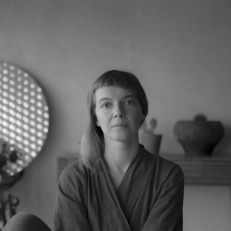
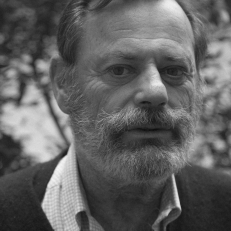
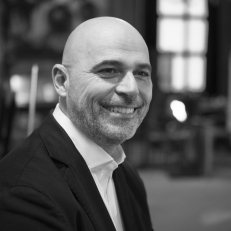
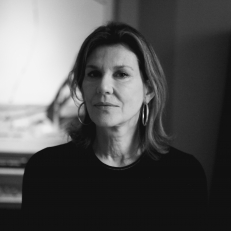
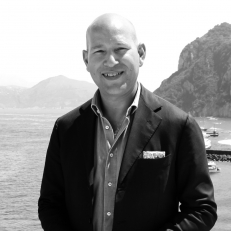
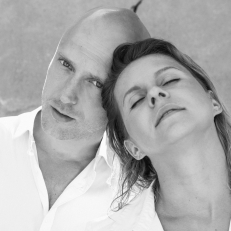
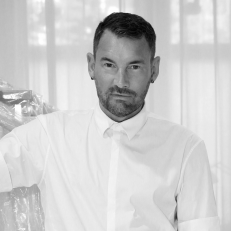
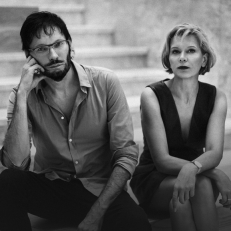
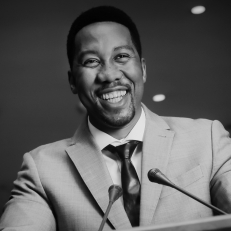
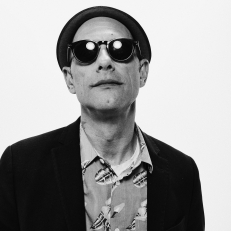


Add a comment